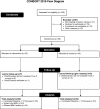The feasibility of text reminders to improve medication adherence in adolescents with asthma
- PMID: 26661717
- PMCID: PMC4901375
- DOI: 10.1093/jamia/ocv158
The feasibility of text reminders to improve medication adherence in adolescents with asthma
Abstract
Objective: Personal health applications have the potential to help patients with chronic disease by improving medication adherence, self-efficacy, and quality of life. The goal of this study was to assess the impact of MyMediHealth (MMH) - a website and a short messaging service (SMS)-based reminder system - on medication adherence and perceived self-efficacy in adolescents with asthma.
Methods: We conducted a block-randomized controlled study in academic pediatric outpatient settings. There were 98 adolescents enrolled. Subjects who were randomized to use MMH were asked to create a medication schedule and receive SMS reminders at designated medication administration times for 3 weeks. Control subjects received action lists as a part of their usual care. Primary outcome measures included MMH usage patterns and self-reports of system usability, medication adherence, asthma control, self-efficacy, and quality of life.
Results: Eighty-nine subjects completed the study, of whom 46 were randomized to the intervention arm. Compared to controls, we found improvements in self-reported medication adherence (P = .011), quality of life (P = .037), and self-efficacy (P = .016). Subjects reported high satisfaction with MMH; however, the level of system usage varied widely, with lower use among African American patients.
Conclusions: MMH was associated with improved medication adherence, perceived quality of life, and self-efficacy.Trial Registration This project was registered under http://clinicaltrials.gov/ identifier NCT01730235.
Keywords: adherence; adolescent; asthma; biomedical informatics; clinical trial; mHealth; mobile technology; personal health records.
© The Author 2015. Published by Oxford University Press on behalf of the American Medical Informatics Association. All rights reserved. For Permissions, please email: journals.permissions@oup.com.
Figures
References
-
- Centers for Disease Control and Prevention. The Power of Prevention. Chronic Disease…the publich health challenge of the 21st century. 2009. http://www.cdc.gov/chronicdisease/pdf/2009-Power-of-Prevention.pdf, Accessed October 14, 2015.
-
- World Health Organization, Sabaté E. Adherence to Long-term Therapies: Evidence for Action. Geneva: World Health Organization; 2003.
-
- Hood KK, Peterson CM, Rohan JM, Drotar D. Association between adherence and glycemic control in pediatric type 1 diabetes: a meta-analysis. Pediatrics. 2009;124(6):e1171–e1179. - PubMed
Publication types
MeSH terms
Associated data
Grants and funding
LinkOut - more resources
Full Text Sources
Other Literature Sources
Medical
Research Materials
Miscellaneous



